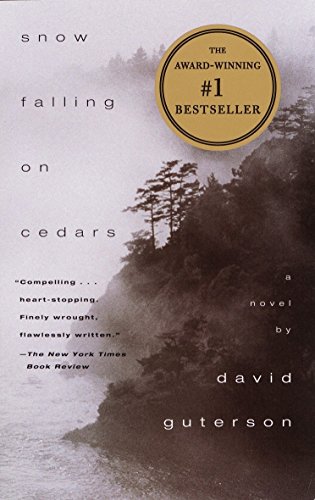Snow Falling on Cedars by David Guterson
A whodunit with courtroom shenanigans and unexpected turns of evidence that is also a mystery, something far richer and deeper, is haunting. The Los Angeles Times
North of Puget Sound, on San Piedro Island, no one can afford to create enemies since it is so remote. However, a Japanese American man called Kabuo Miyamoto is accused of killing a local fisherman in 1954 after his odd drowning death is discovered.
The trial that follows reveals that there is more at risk than just a man’s guilt. Because in San Pedro, memories abound—memories of a charming courtship between a white lad and the Japanese girl who grew up to be Kabuo’s wife, memories of land wanted, paid for, and lost—grow as thickly as cedar trees and fields of luscious strawberries. The recollection of what happened to San Piedro’s Japanese citizens during World War II, when a whole neighbourhood was forced into exile while its neighbours watched, is what haunts the town the most.
Snow Falling on Cedars by David Guterson
- SNOW FALLING ON CEDARS
- DAVID GUTERSON
- FIRST EDITION, 1995
- PENN/FAULKNER AWARD WINNER
It’s a fantastic book. It concerns a trial and prejudices towards Asian Americans in a tiny town in Washington State – once more, a specific period and location. Another surprise awaits at the conclusion. It’s simply a fantastic book with some really lovely characterizations. The reporter covering the trial and his ageing attorney are both quite exceptional characters. Despite being old, weak, and daydreaming about sex, his wisdom commands the attention of the jury.
The level of writing, the characterizations, the plot itself, and the background history of what happened to the Issei, the Nisei, and the villages they lived in all left a lasting impression on me. The effect of the book hasn’t diminished, and if anything, the themes of injustice and bigotry are more pertinent and relevant today than they were when it was first published some 30 years ago.
This is a beautifully written and expertly performed work that simultaneously recounts a breathtaking love tale and conjures up a certain period and epoch in American history. In a sequence of flashback scenes, the narrative follows the protagonist as he struggles to sort through his conflicting emotions and motivations before finally deciding to carry out his destiny. In many ways, this is also a fantastic murder mystery, and the courtroom drama that develops is a startling indictment of the racial tensions and prejudices that were pervasive in this small oceanside town immediately following the end of World War Two.
The reporter/publisher of the tiny local newspaper is covering the tale of the murder trial while also harbouring other, less obvious objectives that come to light as the plot develops. The narrator is a decorated combat veteran who has lost both his arm and his love to another. We start to comprehend the tangled jumble of emotions that the narrator conveys to us as the story shifts from a life-or-death drama to a strange journey into the past and a chronicle of fragile first love lost. This is a work that expertly explores the complexities of human bias and personal feeling while also dealing with a difficult portion of American history without seeking out simple answers or coming up with handy solutions.


 Amazon.com
Amazon.com 




